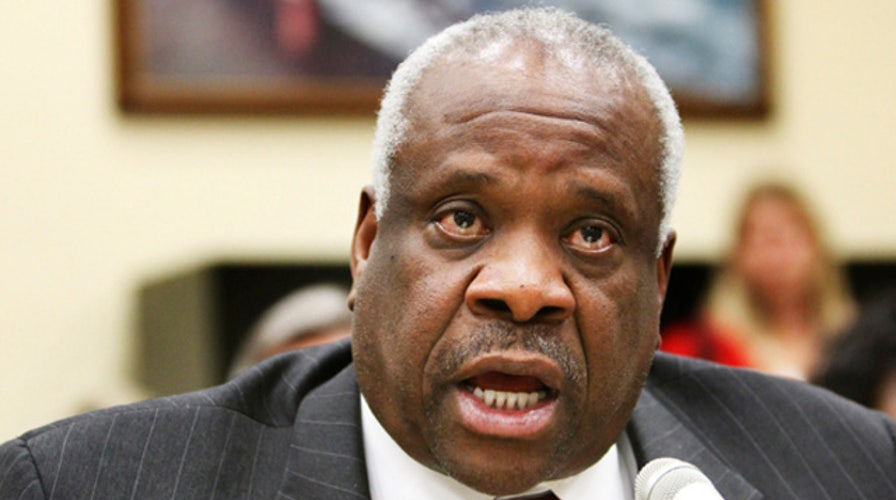Are 'northern liberal elites' more racist than southerners?
Supreme Court Justice Clarence Thomas's remarks on race stir heated debate
This is a rush transcript from "On the Record," February 12, 2014. This copy may not be in its final form and may be updated.
GRETA VAN SUSTEREN, FOX NEWS HOST: Supreme Court Justice Clarence Thomas, the second African-American to serve on the high court, says he has experienced more discrimination in the north than in the south. Justice Thomas saying, quote: "The worst I have been treated was by northern liberal elites. The absolute worse I have ever been treated."
Joining us, Pastor Michel Faulkner, and Kmele Foster, co-host of FOX Business news show -- and the network FOX News Business "The Independents" at 9:00 p.m.
Nice to see both of you.
REV. MICHEL FAULKNER, NEW HORIZON CHURCH & PRESIDENT, THE INSTITUTE FOR LEADERSHIP: Thank you, Greta. Always a pleasure to be with you.
VAN SUSTEREN: First, to you Reverend Faulkner. Your thoughts on what Justice Thomas said?
FAULKNER: I agree with him. You know, I actually served and lived in the south, and I experienced racism. Of course, it exists. But nothing like I did when I came to New York City and experienced the -- I guess what you call the limousine liberals. Because -- and one of the reasons that I think their racism is so visceral is because we express -- as independent free thinkers, we express that we really don't need them to exist. And so we don't give them justification for their existence and they hate us for that.
VAN SUSTEREN: Kmele, what's your thought on this?
KMELE FOSTER, FOX CO-HOST, THE INDEPENDENTS: It's interesting. The Justice said a few things. He also happened to say that we obsess over race quite a bit too much these days in the United States. And that's the part that I really latched on to. I have certainly encountered racial animus because I have views that don't seem appropriate for a guy who happens to look like me.
But I think it's the first portion of this that I really latch on to. The notion that we have been having this perpetual dialogue about race in this country for a number of years. And while we have seemingly entered into what I like to call the Tawana Brawley era civil rights, where we move from manufactured controversies to this ginned-up phony outrage about any number of things, it's these nonissues like the GenX, which turned out not to be the racial watershed moments that they are made out to be. For whatever reason, we have a very difficult time acknowledging where we actually are, which is to say that we have actually defeated the brand of institutionalized naked racism that was predominant during the civil rights era. And we are in another place. Unfortunately, what we're left with is this really crude, hypersensitivity and myopic obsession with race and racism. It actually exists on the left and the right in some important respects.
VAN SUSTEREN: Kmele, Justice Thomas has been called lots of things, including he has been called Uncle Tom.
FOSTER: Sure.
VAN SUSTEREN: I'm curious, now that you are the anchor of "The Independents" on FOX Business -- at 9:00 p.m., I will repeat for you --
(LAUGHTER)
-- are you finding that because you have gotten so much more public that you are getting more insults from people?
FOSTER: You know, no, I haven't found that. But I have certainly heard those insults before. Unfortunately -- and maybe I shouldn't say this. More often than not, it's family that might say something like that.
Quite frankly, I find as an Independent who doesn't happen to adhere to standard racial orthodoxy that I make a lot of friends that way. There are plenty of people who are interested in having conversations with me about race. There are certainly some people who shun me. But I haven't noticed -- it's not debilitating. I think that's what's important to note here. It's a little weird to call that racism in the sense that Dr. King, for example, fought against racism.
VAN SUSTEREN: Reverend, one of the things that Justice Thomas said, and Kmele alluded to, is that people today are more race conscious, politically correct than ever before. Do you agree with that and why would that be?
FAULKNER: I agree with it. And I think it's a very dangerous time that we live in, because this whole political correct thing -- see, this cuts both ways. If you don't agree with the elite or with those who are defining how we are feel about something, then you are labeled and those labels give you a -- the inability to move freely. You have to defend yourself everywhere you go. I mean, we can't say I disagree. The black community is not a monolithic community. We don't all have the same political views. Nor should we. But I think it's important that we understand those terms, that political correctness, is used to keep us in control. Because I do believe that the socially elite do not want to see independent free thinkers, especially African-Americans who can think freely and vote freely outside of the normal Democratic or the normal political machine that controls them.
FOSTER: Well, I might --
(CROSSTALK)
FOSTER: -- take it even a step -- if we are out of time that's OK.
VAN SUSTEREN: We're out of time.
(LAUGHTER)
But everyone can see you at 9:00 p.m. So they'll hear the rest of it over on the Business Channel.
FOSTER: Sounds good.
VAN SUSTEREN: Thank you, both.
FOSTER: Thanks so much, Greta.
FAULKNER: OK. Thank you.

